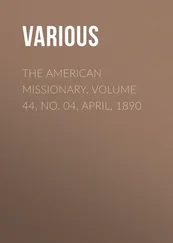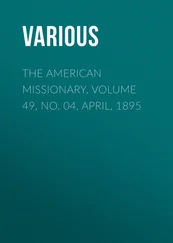Various - Appletons' Popular Science Monthly, April 1899
Здесь есть возможность читать онлайн «Various - Appletons' Popular Science Monthly, April 1899» — ознакомительный отрывок электронной книги совершенно бесплатно, а после прочтения отрывка купить полную версию. В некоторых случаях можно слушать аудио, скачать через торрент в формате fb2 и присутствует краткое содержание. Издательство: Иностранный паблик, Жанр: periodic, foreign_edu, на английском языке. Описание произведения, (предисловие) а так же отзывы посетителей доступны на портале библиотеки ЛибКат.
- Название:Appletons' Popular Science Monthly, April 1899
- Автор:
- Издательство:Иностранный паблик
- Жанр:
- Год:неизвестен
- ISBN:нет данных
- Рейтинг книги:5 / 5. Голосов: 1
-
Избранное:Добавить в избранное
- Отзывы:
-
Ваша оценка:
- 100
- 1
- 2
- 3
- 4
- 5
Appletons' Popular Science Monthly, April 1899: краткое содержание, описание и аннотация
Предлагаем к чтению аннотацию, описание, краткое содержание или предисловие (зависит от того, что написал сам автор книги «Appletons' Popular Science Monthly, April 1899»). Если вы не нашли необходимую информацию о книге — напишите в комментариях, мы постараемся отыскать её.
Appletons' Popular Science Monthly, April 1899 — читать онлайн ознакомительный отрывок
Ниже представлен текст книги, разбитый по страницам. Система сохранения места последней прочитанной страницы, позволяет с удобством читать онлайн бесплатно книгу «Appletons' Popular Science Monthly, April 1899», без необходимости каждый раз заново искать на чём Вы остановились. Поставьте закладку, и сможете в любой момент перейти на страницу, на которой закончили чтение.
Интервал:
Закладка:
The almost absolute dependence of the Federal Government upon the customs duties for revenue through a great part of its existence was a striking fact. The simplicity of collection and the comparatively moderate scale of duties, although considered high at the time of imposition, gave this branch of the possible sources of revenue a magnified importance. The development of the country was slow, and at times greatly hampered by the tariff policy; but until about 1857 no other source of income was needed to meet the expenditures of the Government in a time of peace.
In recent years this has all changed, and not for the better. The immense development in manufactures and financial ability accomplished since 1860 has made a tariff for protection an anachronism. The political features of customs legislation have been pushed so far as almost to overshadow the fiscal qualities. The wave of protectionism that followed the abrogation of the commercial treaties of Europe about 1880 has resulted in tariffs framed with the desire to injure the commerce of other states rather than to meet the needs of a treasury. In the United States this policy has been carried beyond that of Europe, and the tariff now in existence is more protective than any hitherto enforced, short of absolute prohibition of imports.
In more respects than one the tariff law of 1897 was an extreme application of the protective policy. Each year the United States has demonstrated its ability not only to meet the industrial competition of the world on an equal footing, but to engage with it aggressively and with complete success. It is not necessary to give the figures of exports of manufactures to establish this fact; it is now beyond question. To frame a measure of extreme protection was, therefore, to overlook the most striking phase of the industrial situation existing in the United States. With an ability to manufacture cheaply and on a grand scale, and with a capacity to supply the demands of a market larger than any home market, there was no foreign competition to encounter, and the higher rates of duties meant nothing, either for protection or for revenue. In carrying further into action a tariff framed more for protection than for revenue, a twofold error was committed. The provisions were so complicated as to make the application difficult, and in applying these provisions inquisitorial and vexatious regulations were necessary to assure even a reasonable fulfillment of the requirements. In former tariff laws a general description carried a large class of articles, and a uniform duty, usually ad valorem , was collected. But under the demand for a more scientific tariff, these general classes were broken up into a number of enumerated articles, each one carrying a specific or mixed duty, and an omnium or basket clause at the end to catch any article that could not be included in any enumeration. This desire to fix specific rates upon each imported commodity has been applied more generally in the law of 1897 than in any previous tariff act. An examination of the imports of manufactures of textile fibers will illustrate this increase of complexity without any increase of revenue. Indeed, these classifications and rates, being suggested by interested parties, have for their object a reduction of imports, and as a rule a reduction in revenue from them follows.
The second objection to the increasing complexity of the tariff laws is to be found in the petty annoyances imposed upon importers and others in enforcing the not always consistent provisions of the law. These vexations are made all the more telling by the fact that the administration of the law is apt to be in the hands of those who are openly hostile to foreign importations, and therefore regard the importer in an unfriendly spirit. The power given to the customs agents is enormous, and it is not remarkable that it is abused. The demand for samples, the appraisement of articles, the classification of new or compound commodities, all offer room for controversy, which is not always decided by an appeal to the courts of justice. In special instances, where a section of the law has been framed in behalf of a special interest, the attempt to enforce it becomes petty tyranny of the most intolerable kind.
In operation the law soon exhibited its failure as a revenue measure. Although duties were generally increased, the more important articles taxed yielded a smaller revenue than under lower rates. The aggregate collections under the bill did not meet the expectations of its sponsors, and for two reasons: first, because the higher duties discouraged imports; and secondly, the demand for imported articles was steadily decreasing under the expanding ability of home manufactures to meet the needs of the market. No measure short of a direct encouragement to importations can change this situation, or prevent the further shrinkage in the use of foreign manufactures. It follows that the tariff, unless radically altered, can no longer be depended on for a return sufficient to defray one half of the rapidly increasing expenditures of the national Government. By refusing to impose moderate duties on articles of general consumption, revenue is sacrificed; by insisting upon imposing protective duties where little revenue can be had, the tariff is converted into a political weapon. Its dangerous qualities are strengthened by turning these duties against the products of certain countries, a policy specially fit to invite reprisals.
Even the framers of this latest tariff entertained the belief that some provision should be made for breaking its full effect. The familiar scheme for reciprocity treaties, under which moderate concessions in some of the duties could be made, was retained; but France was the only power that could have an object in seriously entertaining the proposition to enter into a negotiation. No real reduction in duties could be given to Germany or any other country, and it has become a recognized fact that Germany does not hesitate to seize an opportunity to exclude the products of the United States, and on the same grounds as support the high duties in the American tariff. The system of drawbacks has ceased to be of much moment in our customs policy, and in the export interest in canned goods finds its chief exercise. Nor does a privilege to manufacture in bond affect more than one article of importance – ores of lead containing silver. No matter how it is regarded, the tariff of 1897 was not framed for revenue, and in experience has not proved sufficiently productive to meet its share of the expenditures of Government. The animus of its sponsors in attaining the immediate political object sacrificed the more important and permanent object of revenue.
Were the true object of customs duties – revenue – to be kept in view in tariff legislation, it would be a simple matter to devise a measure that would be satisfactory and highly productive of revenue. In the fifteen hundred or more articles enumerated in the tariff schedules, more than fourteen hundred are nonproductive, or yield so small a return as to have in the aggregate no appreciable effect on the total receipts. The number left after so large an exclusion can be still further reduced without reducing the revenue one tenth; and it is from a small number of articles, hardly twenty-five, that the great part of the customs revenue is obtained. By reducing the rates of duties on these to a point of highest revenue efficiency, at which the import is not interfered with and yet not encouraged, a higher return could be had than from the existing complicated, overloaded, and political compilation of duties, usually imposed for any reason other than what they will bring into the treasury.
When, therefore, the best methods of Federal taxation are broached, the reform of the tariff stands first in importance. It is necessary to bring it more into line with the industrial conditions of to-day, which call for foreign markets rather than a domestic or closed market; and for a liberal commercial policy in place of one that regards the products of other countries, whether imported in the crude or manufactured forms, as constituting a menace to American labor and American interests. It calls for a systematic and intelligent revision, which shall throw out such duties as are no longer of service even for protection, and to reduce those that are hostile to the products of other countries and bear in themselves the seeds of reprisals in the future. Now that the United States is going into the great markets with its manufactures, and obtaining a foothold against all competitors, the invitation to retaliation holds a danger far greater to its own interests than any that can be inflicted on other peoples. The greater the advances made the more readily will recourse be had to reprisals and hostile legislation; and in support of every act appeal may be had to examples set by the United States. 8 8 "The old protectionist, with the stock arguments about the influence of the tariff upon wages and all the rest of it, is beginning to die out. He told us all he had to say about the 'pauper labor' of Europe, by which he often meant the best educated and most skillful artisans of the world. We got tired of hearing about how the importer paid the tax, how it was Europe and England in particular that was all the time squeezing our lives out, till nearly all of us, being of English ancestry ourselves, wondered whether we, even, could be so good as we hoped we were, if we had sprung from something so essentially perverted and bad. We were told, too, that American tourists who went to Europe and spent money there which they ought to have squandered at home were not friends of their country, and that they did us a particularly hostile act when they brought clothing, statuary, or diamond rings back with them from foreign parts. A season of high prices was a real heaven, and wars and fires were good things because they destroyed property that would have to be replaced, and this would create that demand which, reacting on supply, would increase prices. To say that an article was cheap was to say that the political party in power was no longer worthy of public confidence. It was related that each government could make its people so rich, and the idea was thought to have been traced down from Henry C. Carey, that the rest of the world could be safely disregarded altogether. "Seriously, who believes any of this stuff nowadays? The protectionist is not reckoning with such popular impotency and stupidity. He believes in his fellow-man, and wants to give him a helping hand. He does not care what effect it has on England or Ireland. He is not sure that a protective tariff in and of itself will increase the wages of the workmen. He is even inclined to think that less wages and profits would do well enough for every man, if it were cheaper to live and there were not such extravagant demands upon every person from all sides – this without being a socialist. He is certain that 'a cheap coat' does not necessarily make 'a cheap man,' but the cheaper the coat the better it will be for the wearer. That is what we are all trying to do, improve our processes, increase our effective working power, which means, if you please, to make things cheaper." — The Manufacturer (organ of the Manufacturers' Club of Philadelphia).
Интервал:
Закладка:
Похожие книги на «Appletons' Popular Science Monthly, April 1899»
Представляем Вашему вниманию похожие книги на «Appletons' Popular Science Monthly, April 1899» списком для выбора. Мы отобрали схожую по названию и смыслу литературу в надежде предоставить читателям больше вариантов отыскать новые, интересные, ещё непрочитанные произведения.
Обсуждение, отзывы о книге «Appletons' Popular Science Monthly, April 1899» и просто собственные мнения читателей. Оставьте ваши комментарии, напишите, что Вы думаете о произведении, его смысле или главных героях. Укажите что конкретно понравилось, а что нет, и почему Вы так считаете.












